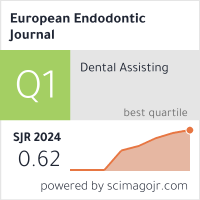Metrics
2024 IMPACT FACTOR
5 year Impact Factor
Eigenfactor Score
2024 CiteScore
Journal Citation Reports
(Clarivate 2025, JIF Rank)
The pH and Bismuth Oxide Particle Size can Affect Diametral Tensile Strength of Mineral Trioxide Aggregate
Mohammad Ali Saghiri1, Armen Asatourian2, Behnam Rahmani3, James Gutmann4, Steven Morgano51Director of Biomaterial and Prosthodontic Laboratory, Department of Restorative Dentistry, Rutgers School of Dental Medicine, NJ; Department of Endodontics, University of the Pacific, Arthur A. Dugoni School of Dentistry, San Francisco, California, USA2Sector of Angiogenesis Regenerative Medicine, Dr. Hajar Afsar Lajevardi Research Cluster (DHAL), Hackensack, NJ, USA
3Sector of Innovative Dentistry and Medicine, Dr. Hajar Afsar Lajevardi Memorial Foundation, Hackensack, NJ
4Department of Endodontics, Nova Southeastern University, College of Dental Medicine, Fort Lauderdale, Florida
5Department of Restorative Dentistry, Rutgers School of Dental Medicine, Newark, NJ
Objective: The aim of the present study was to evaluate the effect of different pHs (4.4, 5.4, 6.4, 7.4, 8.4, and 9.4) and three different particle sizes of bismuth oxide on diametral tensile strength (DTS) of white Mineral Trioxide Aggregate (WMTA).
Methods: Thirty cylindrical moulds were divided into six groups of five; WMTA was mixed, placed inside the moulds, and wrapped in pieces of gauze soaked in synthetic tissue fluid (STF) with pH values of either 4.4, 5.4, 6.4, 7.4, 8.4, 9.4. For bismuth oxide, eighteen similar molds were divided into three groups of six (n=6). Then bismuth oxide with three particle sizes, including fine (120 nm), medium (200 nm), and coarse (10 μm), were provided and added to the Portland cement, which did not have any bismuth oxide to create WMTA. Then WMTA was mixed, placed inside cylindrical molds. After incubation at 95% humidity for 48 hours, samples were subjected to DTS testing by an Instron Universal testing machine with a crosshead speed of 1 mm/min. Then, one sample from each group was subjected to scanning electron microscope (SEM) analysis. Data were analysed by ANOVA and Tukey tests (α=0.05).
Results: The comparison of DTS in pH groups were: 8.4>7.4>9.4>6.4>5.4>4.4 (P<0.05); and in bismuth oxide groups were: fine particles > medium particles > coarse particles (P<0.05). Acidic pH, negatively affected the distribution of Ca2+ and Si4+ ions, while bismuth oxide with fine particles enhanced it.
Conclusion: Acidic pH can decline the DTS of MTA significantly. However, reducing the particle size of bismuth oxide can increase the DTS of MTA significantly.
Conclusion: Acidic pH can decline the DTS of MTA significantly. However, reducing the particle size of bismuth oxide can increase the DTS of MTA significantly. (EEJ-2020-06-132)
Keywords: Bismuth oxide, calcium silicate cement, diametral tensile strength, mineral trioxide aggregate, pH value
Manuscript Language: English
(636 downloaded)



